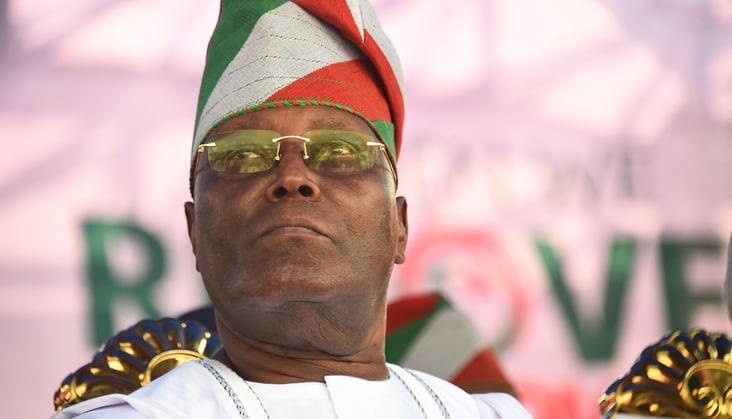BAYO ONANUGA

My attention has just been drawn to former vice-president Atiku Abubakar’s vitriol against the Tinubu administration and the person of President Bola Tinubu.
Every line of the blanket criticism reeks of hate. Except ex-VP Atiku was beclouded when spewing his criticism, why did he not admit some good deeds by this government in the last two years?
While I respect Atiku and every Nigerian’s right to voice their opinions in our vibrant democracy, I need to set the record straight and address the fallacies in Atiku’s commentary.
Unless Atiku still lives in Dubai, he ought to admit that in just two years, President Bola Ahmed Tinubu’s administration has embarked on the most ambitious economic and institutional reforms ever seen in decades.
During the campaign, he never promised that the reforms would be easy and painless. But he was clear they were necessary to rescue the country from the brink of fiscal collapse to reverse years of unsustainable spending and lay a solid foundation for long-term inclusive growth.
The removal of the fuel subsidy and unification of the foreign exchange system were steps successive administrations, including that of Obasanjo-Atiku Abubakar, acknowledged as necessary but failed to implement. Atiku promised the reforms in his manifesto. Indeed, all three major candidates in the election agreed they must be done, except that the responsibility to implement the reforms fell on President Bola Tinubu, as the winner of the 2023 election.
Unlike Atiku and some critics, everyone agrees that the reforms have stabilised government finances, curbed systemic corruption, and enabled direct investments into social programmes and infrastructure. Foreign investors now see Nigeria as an irresistible destination. Since 2023, the Nigerian Exchange has seen its ASI jump from 50,000 to over 110,000, and market capitalisation has increased to N69.4 trillion, from about N30 trillion before Tinubu’s ascension.
Contrary to Atiku’s claim that government policies are “anti-people,” the Tinubu administration, fully acknowledging that its policies affect the vulnerable, has increased investments in social safety nets, introduced targeted interventions for low-income households, and more than doubled the minimum wage, from N30k to N70k. Some states even pay up to N85k to their workers, a feat made possible by increased federal allocations.
Atiku’s claim that education was out of reach for poor Nigerians was entirely off the mark. Everyone knows the claim is false; it’s just an attempt to throw any muck at Bola Tinubu.
Since last year, the government has introduced the Student Loan Scheme to ensure that underprivileged children are not denied education because of poverty. As of the last count, over 600,000 Nigerian students have benefitted from the loans. The loans cover the students’ school fees and living allowances. The loans do not yet cover Nigerians in expensive schools like Atiku’s American University in Yola. What is undeniable is that under Bola Tinubu, higher education is now more accessible to deserving youths.
This administration has also made huge investments in health, including revitalising primary health centres and expanding health insurance. The government is also working hard to reduce the cost of medicines.
Atiku again ignorantly accused the Tinubu administration of borrowing fresh money to support the 2025 budget. He obviously relied on social media gossip that the fresh loan request to the National Assembly was for that purpose. The Finance Minister has debunked this as untrue and said that even this year, the government only wants to borrow about $1.2 billion.
Because Atiku does not like Bola Tinubu’s guts, he forgets to credit his administration with some of the fiscal achievements in the last two years. Revenue has increased phenomenally. Debt service ratio to revenue has declined from 93 percent to 60 percent. This government has paid off the $3.2 billion IMF loan obtained in the Covid years. The current administration has discontinued Ways & Means deficit financing for the first time in decades. State revenue has risen, and subnational governments now have greater resources for local development and to pay their debts. This is the only positive Atiku admitted, forgetting to praise the Tinubu government that made this possible.
This government has admitted honestly that the reforms come with attendant challenges and has worked vigorously to lessen the pain.
But as President Tinubu said in his statement, marking his second anniversary, we have made progress. Inflation is easing, food production is rising, investments are returning, and the foundation for a more prosperous, just, and inclusive Nigeria is being laid. These gains are in plain sight for everyone. Only those who play blind will not see them.
Atiku and his co-travellers in the coalition party he is cobbling together need not worry about their democratic rights. As an acknowledged democrat, President Tinubu will not curtail their rights or silence them.
Finally, criticism must be elevated and constructive. When Atiku opposes government policies, he should also offer a solution. Otherwise, his opposition statements will be dismissed as mere partisan rhetoric and cheap talk.
Nigerians deserve opposition leaders who offer solutions, not just criticism. We invite all Nigerians to judge this administration by its actions, not by the rhetoric of those who have had their opportunities to lead and who bungled the chance in years past, sold national assets for pittance and shortchanged their compatriots.





